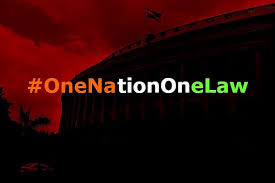Why One Nation Needs One Law.
India is home to unparalleled diversity — in language, religion, region, and caste. Our Constitution guarantees each one of us a sense of dignity regardless of our region, religion, language, or ethnicity across the country. But what if there are more than one set of laws in the country. It is an anomaly which can be disruptive. In a powerful reaffirmation of India’s constitutional unity, Chief Justice of India B R Gavai recently underscored this deep philosophical and legal reasoning behind the Supreme Court’s decision to uphold the abrogation of Article 370. Speaking at the inauguration of the Constitution Preamble Park and unveiling of Dr B R Ambedkar’s statue in Nagpur, CJI Gavai emphasised that having “only one Constitution” is central to India’s unity — an idea that traces its roots to the vision of Dr Ambedkar himself. This is more than a symbolic gesture. It is a legal, moral, and historical reckoning with the idea of justice.
The idea that one nation should be governed by one Constitution is not simply a matter of administrative convenience; it is foundational to the integrity of the Republic. Dr BR Ambedkar maintained that a single constitutional framework was essential to maintaining the unity and integrity of a diverse nation. Ambedkar believed in a Constitution that was both federal and unitary in spirit — capable of embracing diversity while ensuring a central unity. The existence of Article 370, which granted Jammu and Kashmir its own Constitution and special status, was thus contrary to this foundational vision. The Constitution, though federal in structure, vests significant powers in the Union during times of crisis, war, or disintegration. Ambedkar defended this framework, saying the Indian Constitution was designed to remain united through both peace and conflict.
Article 370, inserted as a temporary provision, effectively created an exception to the rule of uniform citizenship. It allowed Jammu & Kashmir to operate under a separate Constitution and enjoy special privileges, creating a sense of legal and political separation from the rest of India. Over time, this provision, which was supposed to fade, calcified into a structural anomaly. When the Parliament abrogated Article 370 in 2019, it was challenged in court.
The five-judge Constitution Bench of the Supreme Court, including CJI Gavai, upheld the decision in December 2023. This ruling was a declaration that India, in its truest constitutional spirit, must be governed by one set of laws and rights for all its citizens, regardless of region. Whether one lives in Kerala or Kashmir, every citizen must be equal before the law — not just in theory, but in real life situations. This is what our Constitution guarantees. Fragmented legal frameworks breed fragmented identities. In contrast, a unified constitutional order promotes a shared sense of belonging and purpose. While Pakistan, Sri Lanka, Nepal, and Bangladesh have had constitutional breakdowns, India has stood strong, thanks to our Constitution. Long live the Constitution!
